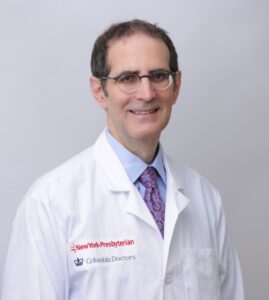
Though largely preventable, colorectal cancer is the second leading cause of cancer deaths in the U.S., as the American Cancer Society (ACS) alarms. Younger people are at risk for getting the disease – the ACS estimates that in 2021 approximately 10.3% of new colorectal cancers occur in people under age 50.
“Colorectal cancer is no longer a disease that only affects older populations,” says Dr. David Kauvar, director of gastroenterology at NewYork-Presbyterian Lawrence, and an assistant professor of medicine at Columbia University Vagelos College of Physicians and Surgeons. “While the rate of the cancer has decreased among older adults, largely due to regular colonoscopies, the rate of this disease has more than doubled among adults younger than 50.”
Why are younger people more often diagnosed with colorectal cancer and what preventative steps can be undertaken to address this alarming trend? In recognition of Colorectal Cancer Awareness Month in March, Dr. Kauvar and his colleagues at NewYork-Presbyterian are determined to raise awareness of the disease and shed light on colorectal cancer prevention.
- What is colorectal cancer?
Colorectal cancer starts as a growth on the inner lining of the colon or rectum. These growths are called polyps. Some types of polyps can change into cancer over time, but not all polyps become cancer. The chance of a polyp turning into cancer depends on its type. Colon cancer and rectal cancer are often grouped together because they have many features in common. - What are colorectal cancer symptoms and risk factors?
Colorectal cancer symptoms are similar to those of common gastrointestinal issues and usually can include abdominal pain, blood in stool, changes in bowel habits, tiredness, fatigue, unexplained weight loss and decreased appetite. Those whose family members experienced colorectal cancer should inquire about undergoing genetic testing as they are at high risk for the disease.In addition to family history, factors that can increase your risk may include alcohol use, a diet rich in red or processed meat, obesity, and smoking. People with ulcerative colitis or Crohn’s disease, as well as certain ethnicities, especially African Americans, are more likely to get colorectal cancer.
- At what age should I start screening for colorectal cancer, and what types of screenings are available?
The recommendation has been to start screenings for people at age 50 but in light of more recent data, the new advice is to start screening at age 45. Most insurance companies will recognize the younger age as appropriate for screening but not all, as yet. People at high risk for colorectal cancer should consult with their doctor about the most appropriate time to begin screenings. There are a few colorectal cancer screening strategies, including at-home stool tests and a colonoscopy exam. At-home tests are designed to detect DNA abnormalities or blood in your stool which might be symptoms of colorectal cancer. Colonoscopy, however, remains the most effective and reliable form of preventing colorectal cancer. During this medical exam, the doctor checks for polyps inside the rectum and the entire colon and can remove any polyps found during the procedure.The COVID-19 pandemic caused many to delay their scheduled colonoscopies. The procedure is available at NewYork-Presbyterian campuses, including NewYork-Presbyterian Lawrence Hospital and NewYork-Presbyterian Hudson Valley Hospital, and you should not wait any longer to schedule this lifesaving screening. - What are the causes behind the rapid increase in colorectal cancer among young adults?
It’s not yet clear why more young people are impacted by the disease, though certain genetic conditions, such as Lynch syndrome, and lifestyle risk factors (diet, obesity and smoking, among others) do raise the risk of developing colorectal cancer at a young age. Therefore, preventative measures and a colon cancer screening earlier, at age 45 as opposed to 50, are even more important.
- What can I do to ensure promote colon cancer health?
While the most effective way to prevent colorectal cancer is through a colonoscopy, you can proactively reduce your risk for developing colorectal cancer by maintaining healthy lifestyle habits. Make sure to exercise regularly, eat a high fiber diet and reduce intake of red or processed meats. Avoid smoking and excessive alcohol consumption. If you have any concerns, do not wait to see a specialist and do not delay any necessary medical procedures.







